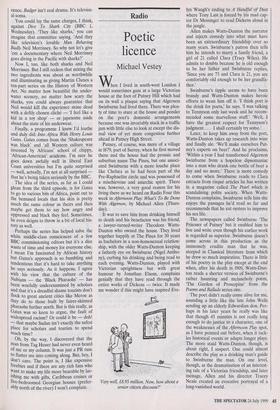Radio
Poetic licence
Michael Vestey
hen I lived in south-west London I would sometimes gaze at a large Victorian house at the foot of Putney Hill which had on its wall a plaque saying that Algernon Swinburne had lived there. There was plen- ty of time to stare at the house and ponder on the poet's domestic arrangements because one was invariably stuck in a traffic jam with little else to look at except the dis- mal view of yet more congestion further ahead in Putney High Street.
Putney, of course, was more of a village in 1879, part of Surrey, when he first moved there and the house had the prosaic and suburban name The Pines, but one associ- ated Swinburne with a more louche place like Chelsea as he had been part of the Pre-Raphaelite circle and was possessed of a mischievous and anarchic spirit. There was, however, a very good reason for his living there as we heard on Radio Four this week in Afternoon Play: What's To Be Done With Algemon, by Michael Allen (Thurs- day).
It was to save him from drinking himself to death and his benefactor was his friend, a lawyer-turned-writer Theodore Watts- Dunton who owned the house. They lived together happily at The Pines for 30 years as bachelors in a non-homosexual relation- ship, with the older Watts-Dunton keeping a fatherly eye on Swinburne (Nigel Antho- ny), curbing his drinking and being read to each evening. Watts-Dunton, played with Victorian uprightness but with great humour by Jonathan Elsom, complains genially that they have read through the entire works of Dickens — twice. It made me wonder if this might have inspired Eve- `Very well, £8.95 million. Now, how about a senior citizen discount?' lyn Waugh's ending to A Handful of Dust where Tony Last is forced by his mad cap- tor Dr Messinger to read Dickens aloud in the jungle.
Allen makes Watts-Dunton the narrator and injects comedy into what must have been an extraordinary friendship over so many years. Swinburne's patron then tells him he intends to marry a family friend, a girl of 21 called Clara (Tracy Wiles). He admits to doubts because he is old enough to be her father and Swinburne replies, `Since you are 73 and Clara is 21, you are comfortably old enough to be her grandfa- ther.'
Swinburne's tipple seems to have been brandy and Watts-Dunton makes heroic efforts to wean him off it. 'I think port is the drink for poets,' he says. 'I was talking to Tennyson only last week and he recom- mended some marvellous stuff."Well, I have the greatest respect for Tennyson's judgment . . . I shall certainly try some.'
Later, to keep him away from the port, Watts-Dunton takes up research into wine and finally ale. 'We'll make ourselves Put- ney's experts on beer!' And he proclaims, `Within a year I had transformed Algernon Swinburne from a hopeless dipsomaniac into a man who drank one bottle of beer a day and no more.' There is more comedy to come when Swinburne reads to Clara extracts from risque articles he has written in a magazine called The Pearl which is scandalising polite society. When Watts- Dunton complains, Swinburne tells him she enjoys the passages he'd read so far and recommends that he eat oysters to improve his sex life.
The newspapers called Swinburne 'The Prisoner of Putney' but it enabled him to live and write even though his earlier work is regarded as superior. Swinburne doesn't come across in this production as the immensely erudite man that he was, steeped in Classical literature from which he drew so much inspiration. There is little of his poetry in the play except at the end when, after his death in 1909, Watts-Dun- ton reads a shorter version of Swinburne's rather haunting and melancholy poem, `The Garden of Proserpine' from the Poems and Ballads series one.
The poet didn't really come alive for me, sounding a little like the late John Wells sending up an elderly Edwardian don. Per- haps in his later years he really was like that though 45 minutes is not really long enough to do justice to a character, one of the weaknesses of the Afternoon Play spot, as I have pointed out before, when it tack- les historical events or adapts longer plays. The more staid Watts-Dunton, though, is about right, I suspect. One could almost describe the play as a drinking man's guide to Swinburne the man. On one level, though, as the dramatisation of an interest- ing tale of a Victorian friendship, and later ménage, Men and his director Tracey Neale created an evocative portrayal of a long-vanished world.


























































 Previous page
Previous page